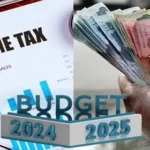(Web Desk) — The Senate Standing Committee on Finance has expressed grave concerns regarding the proposed tax measures in the upcoming fiscal year’s budget, warning that these measures will exacerbate inflation and worsen malnutrition in the country.
The committee’s recommendations to the Finance Ministry and the Federal Board of Revenue (FBR) include the withdrawal of the proposed 18% GST on children’s nutrition products, as reported by various media outlets.
During a meeting on Saturday, Committee Chairman Senator Saleem Mandviwalla voiced strong opposition to the imposition of taxes on essential food items. The committee unanimously rejected the proposed taxes on locally produced baby food, infant nutrition, and packaged milk.
The budget has sparked criticism from lawmakers across the spectrum, including members of the ruling PML-N, PPP, and opposition Senators. The FBR has faced backlash for its heavy taxation on essential goods, which many argue will significantly impact the common man’s livelihood.
The committee specifically condemned the proposal to impose an 18% sales tax on baby milk, with members highlighting the country’s 40% stunting rate as a critical issue. PML-N Senator Anusha Rehman and PPP Senator Sherry Rehman described the increase in sales tax on milk as harsh and noted the lack of prior consultation before implementing such decisions.
In his budget speech, Finance Minister Muhammad Aurangzeb stressed the importance of proper nutrition during the first 1,000 days of a child’s life and the urgent need to combat stunting. However, industry experts argue that the proposed 18% GST on locally produced infant formula, baby food, and child nutrition milk powders contradicts these goals and is counterproductive.
In previous meetings, industry representatives, aware of the economic challenges, suggested a phased implementation of general sales tax over three years as a compromise. Their proposal included a 5% tax in the first year, 10% in the second year, and 18% in the third year.
Given the high inflation, it is essential to note that locally produced infant formula, baby food, and fortified child nutrition milk powders are about 50% cheaper than imported versions. This makes them more accessible to the general population and reduces the burden on foreign exchange reserves.




























